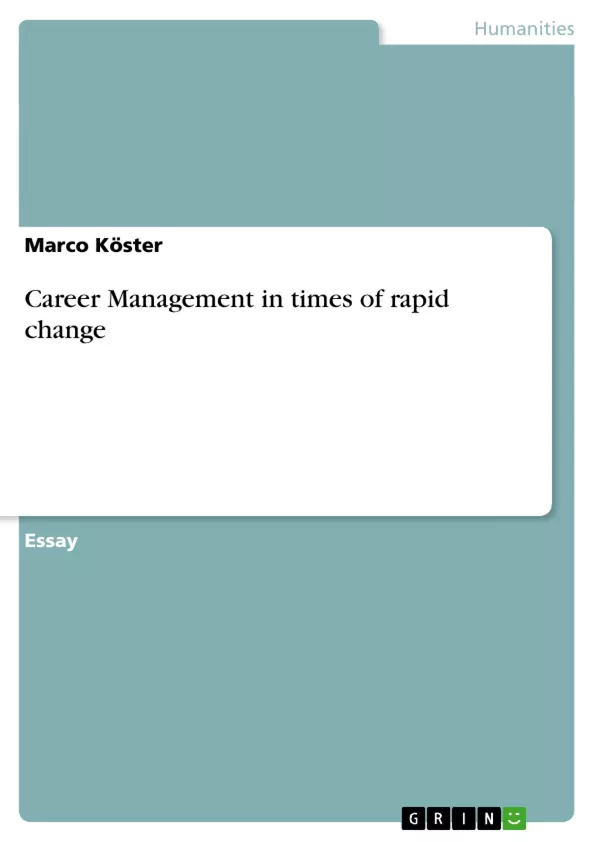Today’s organisational demand for high flexibility can mainly be attributed to the rapidly changing global economic and social landscape. Organisations find themselves confronted with the need for ongoing transformation as environmental discontinuity requires permanent and accelerated adaptation. There is little doubt that these processes of change have considerable impact on the nature of work and pattern of employment. In this essay, the ‘new’ shape of careers in rapidly changing environments is examined. As not only economic but also social environments of organisations change, newly emerging career expectations of today’s individuals cannot be neglected. It is essential to review these changes to understand arising necessities in career management. Having established the major features of present careers, the essay proceeds to discussing the responisbility for managing careers. It raises the question, if the individual or the organisation is responsible for career management and outlines issues to be addressed. In a conclusion the main results are briefly summarized.
Inhaltsverzeichnis (Table of Contents)
- 1. Introduction
- 2. The 'new' shape of careers
- The 'new' organisation
- The 'new' individual
- Implications for careers
- 3. Who should manage careers?
- 3.1 The individual: holding the red thread
- 3.2 The organisation: issues to be addressed
- 4. Conclusion
Zielsetzung und Themenschwerpunkte (Objectives and Key Themes)
This essay aims to examine the evolving nature of careers in rapidly changing organizational environments, considering both the individual's perspective and the organization's role in career management. It explores how the shift towards flexibility and adaptation in organizations impacts career paths and expectations.
- The impact of rapid environmental change on organizational structures and employee expectations.
- The evolution of career paths, moving beyond traditional hierarchical models.
- The changing role of individuals in managing their own careers.
- The challenges and responsibilities of organizations in facilitating career development.
- The influence of demographic changes on the workforce and career management.
Zusammenfassung der Kapitel (Chapter Summaries)
- Chapter 1: Introduction introduces the context of rapid change in today's global economic and social landscape, emphasizing the need for organizational transformation and adaptation. It highlights the impact of these changes on the nature of work and employment patterns, setting the stage for exploring the 'new' shape of careers.
- Chapter 2: The 'new' shape of careers delves into the changing organizational landscape characterized by decentralization, empowerment, and flatter structures. It explores the evolving expectations of individuals, emphasizing their desire for control over their careers and a holistic view of success that includes non-work factors. The chapter also considers demographic changes impacting the workforce and their implications for careers.
- Chapter 3: Who should manage careers? examines the responsibility for career management, focusing on both the individual and the organization. It presents the individual's perspective on holding the "red thread" of their career, emphasizing their active role in career planning and development. The chapter then explores the organizational perspective, outlining key issues to be addressed in facilitating and supporting career management within the organization.
Schlüsselwörter (Keywords)
This essay focuses on the key concepts of career management, organizational change, individual responsibility, career development, flexible work environments, and the impact of global economic and social trends on both organizational structures and individual career expectations.
Frequently Asked Questions
How has the global landscape changed career management?
Rapid economic and social changes require organizations to be highly flexible, which in turn leads to a shift from traditional hierarchical models to flatter, more adaptive career paths.
Who is responsible for managing a career in the modern world?
The responsibility is shared. Individuals are increasingly expected to take an active role in planning their own development, while organizations must facilitate and support these processes.
What does the "new" individual expect from a career?
Modern individuals seek more control over their career paths and a holistic view of success that balances professional achievements with non-work life factors.
What is the "new" organization characterized by?
New organizational structures focus on decentralization, empowerment of employees, and the removal of rigid hierarchies to ensure rapid adaptation to environmental changes.
How do demographic changes impact the workforce?
Changing demographics influence employee expectations and the availability of talent, forcing organizations to rethink how they attract and retain workers through career development.
- Quote paper
- Marco Köster (Author), 2002, Career Management in times of rapid change, Munich, GRIN Verlag, https://www.grin.com/document/25296



